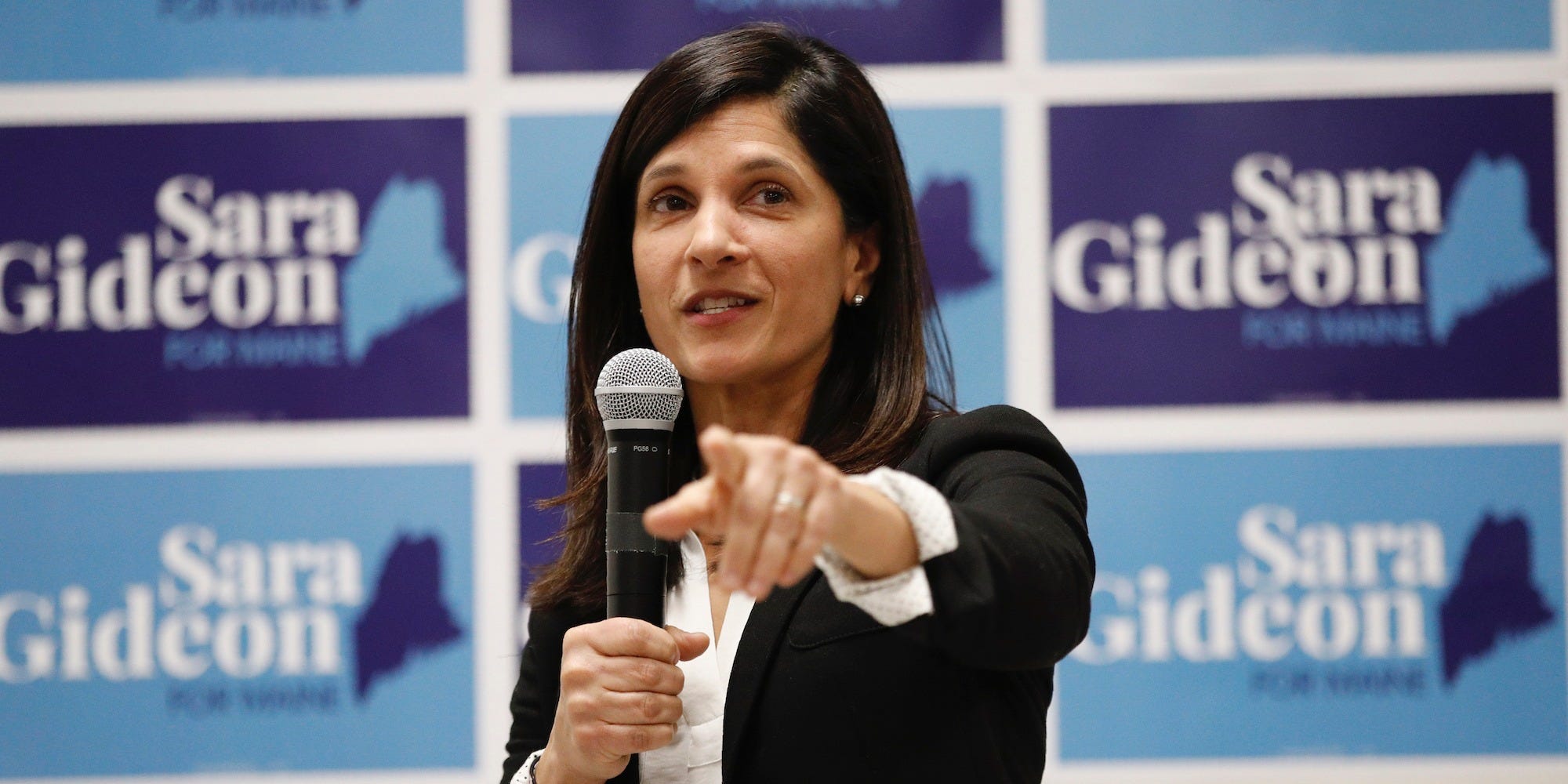- GOP Sen. Susan Collins of Maine is facing the toughest re-election battle of her career against Maine State House Speaker Sara Gideon.
- For decades, Collins has cultivated a unique political brand as an independent, moderate New England Republican.
-
Trump winning the presidency and taking over the GOP mantle made it much more difficult for Collins to thread the needle between being a member of the Republican party and cultivating her own unique brand.
- Visit Business Insider’s homepage for more stories.
Sara Gideon, the Speaker of the Maine House of Representatives, is challenging fourth-term GOP Sen. Susan Collins in Maine in the most re-election competitive bid of Collins’ career.
The candidates:
For decades, Collins cultivated a unique political brand as an independent, moderate New England Republican who was supportive of abortion access and LGBTQ rights. In 2019, the Lugar Center at Georgetown University rated her as the most bipartisan member of the US Senate in the 116th Congress.
For most of her career, Collins enjoyed high approval ratings from her constituents for her strong bipartisan record in the Senate and was easily re-elected in 2002, 2008, and 2014.
But Trump winning the presidency in 2016 and taking over the GOP mantle made it much more difficult for Collins to thread the needle between being a member of the Republican party and maintaining her own highly specialized brand of bipartisan politics.
While Collins broke with the party to vote against repealing with the Affordable Care Act along with GOP Sen. Lisa Murkowski in 2017, she's subsequently infuriated some Democrats and voters by voting to confirm Justice Brett Kavanaugh in the fall of 2018.
Gideon, a four-term state representative who was recruited early on by the Senate Democrats' campaign arm, easily consolidated the Democratic field and has proven to be a prolific fundraiser, substantially outraising Collins in 2020's most recent fundraising quarter.
When she formally clinched the nomination on July 14, she also received a $4 million windfall that activists raised against Collins' eventual Democratic opponent when she voted to confirm Kavanaugh in October 2018.
The stakes:
In addition to winning back the White House, regaining control of the US Senate for the first time since 2015 is a top priority for Democrats and would be a major accomplishment towards either delivering on a future president Joe Biden's policy goals or thwarting President Donald Trump's second-term agenda.
Currently, the US Senate is made up of 53 Republicans, 45 Democrats, and two independents that caucus with Democrats, winning that Democrats need to win back a net total of four seats to have a 51-seat majority (if Biden wins, his vice president would also serve as president of the Senate and would be a tie-breaker vote).
Collins is no stranger to winning split-ticket crossover votes. In the two past presidential elections where she was also up f0r re-election, 1996 and 2008, she won election by double-digit margins both times despite former Presidents Bill Clinton and Barack Obama carrying the state of Maine in the electoral college.
But 2020 will be the biggest test yet of whether Collins can separate herself from Trump's increasingly toxic brand and worsening approval ratings on his handling of the COVID-19 crisis - not to mention some of her own most controversial votes.
Collins clearly argued and emphasizes that she hasn't changed her approach to legislating or become a far-right partisan, rather, the political world around her has gotten substantially more toxic and divisive.
But so far, the Senator has struggled somewhat to land consistent lines of attack on Gideon, with her two most recent campaign ads either highlighting all of Gideon's policy priorities and arguing that Gideon can't prioritize multiple policy goals at once or re-iterating all of Gideon's criticisms of her record.
A Colby College poll released July 28 found Collins' favorability nine points underwater, with 42% of registered voters holding a favorable rating and 51% holding an unfavorable rating compared to 46% who held a favorable view of Gideon and 36% who held an unfavorable view.
The money race: Gideon has both outraised and outspent Collins so far this cycle, according to the Center for Responsive Politics. In 2020's second fundraising quarter, Gideon brought in $8.1 million compared to $3 million for Collins.
What the polling says: There's been little high-quality nonpartisan polling of the race. The most recent survey conducted by Colby College July 18-24 showed Gideon leading Collins by five points, 44% to 39% with 12% undecided.
What experts say: The Cook Political Report, Inside Elections, and Sabato's Crystal Ball at the University of Virginia Center for Politics all rate this race a toss-up and rate Maine as likely Democratic in the electoral college.

